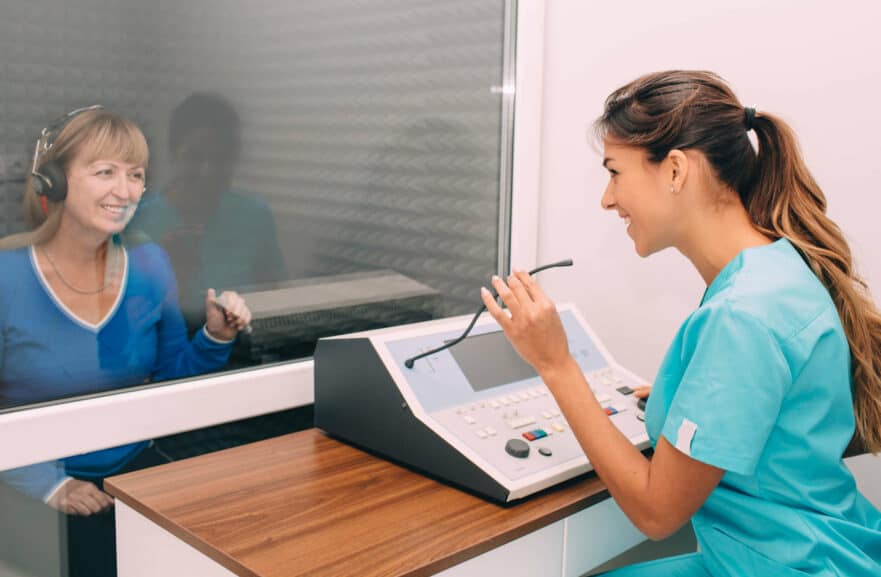- The Harm of Smoking to the Ears - April 9, 2025
- The Importance of Exercise for Hearing Health - March 11, 2025
- Movie Theaters and Hearing Aids - February 13, 2025
If you’ve scheduled a hearing test, you’re taking a significant step toward understanding your hearing health. This proactive approach can lead to improved communication and a better quality of life. In this comprehensive guide, we will walk you through what to expect during a hearing test, preparing you for a journey to improved hearing.
The Importance of a Hearing Test
Hearing tests serve as diagnostic tools to evaluate your hearing ability. Early detection of hearing loss allows for timely intervention, leading to better treatment outcomes. A hearing test also provides valuable insights into the type and degree of hearing loss, which are essential for crafting a personalized treatment plan.
1. The Consultation: Discussing Your Hearing Concerns
Your journey to better hearing typically begins with a consultation. During this initial step, you’ll meet with a hearing health specialist. This is an opportunity to discuss your hearing concerns, medical history, and any other relevant information. It’s crucial to be open and honest about your hearing difficulties, as this information will guide us in tailoring the hearing test to your specific needs.
2. Otoscopy: Visual Inspection of the Ear
The next step is a visual inspection of your ears. We’ll examine your ear canals and eardrums using a handheld instrument called an otoscope. This inspection helps identify any visible blockages, earwax accumulation, or signs of infection. These factors can affect your hearing and may require treatment before conducting the hearing test.
3. Pure-Tone Audiometry: Testing Your Hearing Thresholds
Pure-tone audiometry is the most common hearing test used to evaluate your ability to hear different pitches or frequencies. You’ll sit in a soundproof booth or wear special headphones. During the test, you’ll hear a series of tones at varying volumes and frequencies through the headphones. Your task is to respond every time you hear a sound by either raising your hand or pressing a button.
The results are plotted on an audiogram, a graph that shows your hearing thresholds for different frequencies. This audiogram provides a clear picture of your hearing ability, indicating whether you have hearing loss. It also shows the degree of hearing loss you have.
4. Speech Audiometry: Assessing Speech Recognition
In addition to pure-tone audiometry, speech audiometry assesses your ability to understand spoken words. You will listen to a series of words or sentences at various volumes, repeating them back to the hearing health specialist. This helps evaluate your speech recognition abilities and provides insight into how well you understand spoken language in real-life situations.
5. Tympanometry: Assessing Middle Ear Function
Tympanometry is a test that assesses the mobility of your eardrum and the condition of the middle ear. A soft probe is gently placed in your ear, and air pressure is varied to measure the eardrum’s response. This test helps identify any issues in the middle ear, such as fluid accumulation or eardrum problems, which can affect your hearing.
6. Bone Conduction Testing: Identifying the Type of Hearing Loss
In some cases, a bone conduction test may be used. This test evaluates your inner ear’s response to sound by bypassing the outer and middle ear. A bone oscillator is placed against the bone behind your ear. If you have conductive hearing loss (related to the middle or outer ear), this test will reveal whether your inner ear can still process sound effectively.
7. Results and Recommendations: Your Personalized Plan
Following the hearing test, we’ll discuss the results with you. If hearing loss is detected, will will explain the type and degree of hearing loss, and recommend suitable treatment options. Based on your specific needs and lifestyle, recommendations may include hearing aids, assistive listening devices, or other interventions. Your hearing health specialist will work closely with you to create a personalized plan for addressing your hearing concerns.
Take a Step Towards Better Hearing
A hearing test is the first step on the path to better hearing and improved quality of life. By knowing what to expect during a hearing test, you can approach the process with confidence and ease. Early detection and intervention for hearing loss can make a significant difference in your overall well-being. Don’t hesitate! Schedule a hearing test today and take that essential step toward better hearing and a brighter future.

